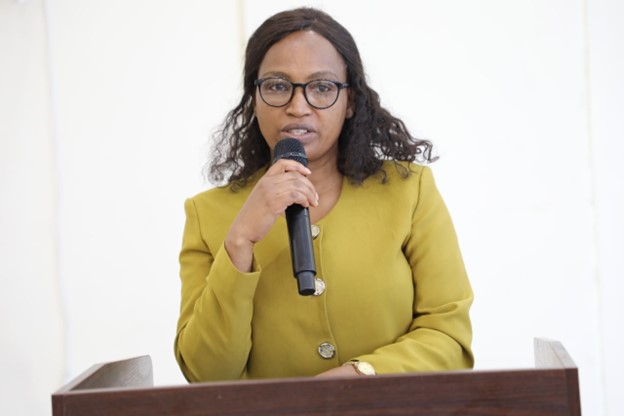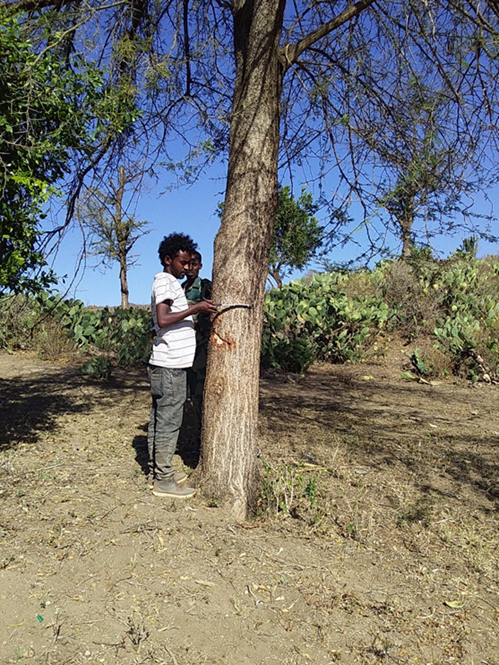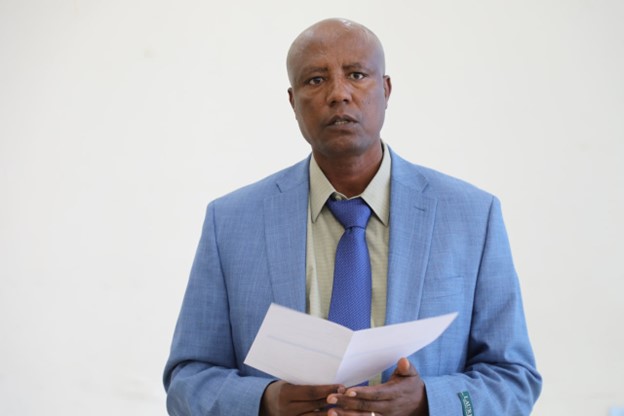 Workshop participants, including RFS Ethiopia programme manager Birara Chekol (right), listen intently to the university presentations. (Credit: Mezgebe Tagesse, Photographer, EPA)
Workshop participants, including RFS Ethiopia programme manager Birara Chekol (right), listen intently to the university presentations. (Credit: Mezgebe Tagesse, Photographer, EPA) Research institutions have contributed immeasurably to the knowledge generated through the RFS Ethiopia project. To prepare for the project closing in 2023, partner universities gathered for a workshop to discuss their scientific findings, and lay out next steps for scaling and continuing research after the project ends.
The Integrated Landscape Management to Enhance Food Security and Ecosystem Resilience project - or RFS Ethiopia for short - has been working to facilitate multi-stakeholder platforms (MSPs) since the programme began in 2017.
MSPs bring together the unique skills, resources, expertise and capacities of stakeholders across sectors and scales towards a common goal. For RFS Ethiopia - which is implemented by the UN Development Programme and the Environmental Protection Authority (EPA) of Ethiopia - universities and research institutions have played the important role of working alongside the project team to undertake research, build capacities, introduce and explore new technologies, identify key issues at the woreda level, and provide technical support. All this and more are translated into helpful tools to support other stakeholders interested in scaling food security.
One of the key objectives of facilitating MSPs under the RFS programme is the sustainability of project activities, so on 18 February 2023, RFS Ethiopia held a workshop for partner universities to look ahead into the future together.

Four universities represented their research
efforts at the workshop, which was held in the town of Bishoftu. The main
objectives of the workshop were for the universities to share with each other
their contributions to RFS and explore their upcoming roles and
responsibilities for ensuring sustainability and scaling up best practices for
national benefit.
The universities involved were Haramaya, Wolaita Sodo, Hawassa and Debre Berhan Universities, which work in the Doba, Dugna fango, Belatezuria and Angolela RFS project districts respectively. The universities have covered an incredible amount of ground through research into everything from soil health to community-identified needs, informing RFS activities and paving the way forward.
At Debere Berhan University, for example, a scoping study engaged 240 households from 2 woredas in focus group discussions, individual interviews and questionnaires to identify the most pressing problems experienced by farmers on the ground. The most pressing issues listed were water quality and scarcity, food insecurity, animal production, and barriers to engaging with project activities like technical capacity or appropriate conditions for creating a tree seedling nursery. To make RFS project activities sustainable, the researchers have proposed the following actions:
Addressing the needs of unique contexts, each university has engaged in and is making recommendations for further studies and projects based on their findings.
Researchers at Haramaya University made a case for increasing biodiversity in the Doba woreda when they noticed it didn’t measure up with the country’s status as having the fifth-largest floral composition in tropical Africa. Consequently, the surrounding woods were not reaching their full potential for the vital ecosystem services they provide, like supporting livelihoods, soil health and carbon stocks. The team collected tree stocks and soil samples and their suspicions were confirmed - the RFS project intervention area was rated as poor in diversity on the Shannon diversity index.

From this finding, and the results that soil
carbon stocks are low to medium in the project site, the university team made
several recommendations for the RFS Ethiopia project. The primary
considerations are increasing tree diversity in the area through promoting
agroforestry and tree planting with indigenous species and multi-purpose trees,
and integrating site-specific soil and water conservation interventions. In
supporting this, researchers and students have partnered with the project on
providing capacity training for establishing and managing an improved fruit
tree nursery, conducting grafting technology, engaging in experience sharing,
and providing technical support for farmers on the ground.
These are just a few of the contributions that were presented at the February workshop in Ethiopia, but the work of university partners has had a major impact on the RFS project. Now that the project is nearly closed, connections facilitated through the MSPs are moving new avenues for research and development onward and upward through robust partnerships.

Subscribe to our monthly newsletter to receive updates on stories directly from the field across all our projects, upcoming events, new resources, and more.